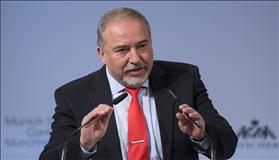Defense Minister Lieberman takes a stand against extremist rabbis
Rabbis are undermining the foundations of the State
Yesterday, Defense Minister Liberman reacted to recent public pronouncements of leading Israeli rabbis from the "Zionist ultra-Orthodox" camp that were aimed against women's military service.
01/02/2018 22:22
Tags: IDF · women · rabbis · draft

Minister Lieberman, source: Wikipedia
The battle over both the principle of equality in shouldering the civic burden (namely: whether yeshiva students are going to do their share in defense of the country), as well as the controversy over women serving in the IDF, are heating up and nearing an explosion point.
Yesterday, Defense Minister Liberman reacted to recent public pronouncements of leading Israeli rabbis from the "Zionist ultra-Orthodox" camp that were aimed against women's military service. Liberman said, "Anyone who does not accept the reality in which (in the army - U.R.) only the commander gives the orders - has no place. I made it crystal clear that rabbis who are trying to challenge this reality will have no foothold in the IDF... These are basic things. This is an attempt to undermine the base of the building we all live in. This is tantamount to dismantling the foundations of the State in its entirety."
Liberman's strong language followed on a number of public pronouncements of prominently placed rabbinic figures who are part of a growing campaign against women serving in combat roles and women's service in the military altogether. Rabbi Shlomo Aviner of the Beth El community who heads the Ateret Yerushaliyim Yeshiva urged religious soldiers to serve only in units with no women or else refuse to enlist. Rabbi Shmuel Eliyahu, the Chief Rabbi of Tzfat, expressed support for Rabbi Aviner's position and attacked the Chief of Staff who "leads the IDF in an extreme liberal direction, which is antithetical to religion," and he called on him to resign from office. In a seminar organized for hundreds of religious girls, harsh admonitions and unfounded claims were voiced by Zionist Orthodox rabbis, most of whom draw their salaries from the State. The seminar was called "The essence and uniqueness of women." The thrust of the rabbinic message was that army service is inappropriate for women and that their enlistment is based on evil motives. Rabbi Eliyahu said, "You put boys and girls together in an armored personnel carrier, at a guard post... how do you expect the woman to start a family afterwards? It was turned into a principle, and the desire of the girls to contribute to the Jewish people is being abused. This is not a military consideration. This is about values. This is not about equality, nor about women's dignity. It is about a new value: gender." Rabbi Tzvi Kostiner, the head of a yeshiva in the Negev, claimed that "the attempt to draft women is part of a culture war and an effort to destroy the family." Rabbi David Pendel, another yeshiva head who trains Zionist Orthodox soldiers, explained that the role of women is to build "a home of holiness" and stressed that "we will not allow any agenda to blur femininity." Rabbi Joshua Van Dyke, another yeshiva head, said that "there is a feminine character. There is feminine uniqueness. When you try to turn a woman into a man, it reduces child birth, and it is humiliating and degrading to women."
Clearly this escalation in its intensity and harshness of the assault on women's military service is an increasingly hysterical response to the fact that more and more religious young women choose to serve in the IDF
Clearly this escalation in its intensity and harshness of the assault on women's military service is an increasingly hysterical response to the fact that more and more religious young women choose to serve in the IDF, in defiance of these rabbinic edicts. They clearly demonstrate that one may embrace both a religious lifestyle and an active role in the defense of the People and the Land.
The battle over these issues, military service by yeshiva students (see the editorial on the left) and women in the army, is one aspect of a multi-faceted battle over the soul and character of the state of Israel. It also focuses on other current points of conflict (such as the right to family, blue laws, refusal to enter to workforce and teach core curricular studies, the Kotel controversy, and many others). As Hiddush has argued from its inception, the challenge of religious freedom and equality should not and does not separate political left from political right, nor does it distinguish between Orthodox and non-Orthodox. Support for religious freedom and equality comes from the overwhelming majority of people who may not share political or religious preferences. It is a battle between those who desire to see Israel as truly both Jewish and democratic, and those for whom nothing short of a theocracy will satisfy their view of a Jewish state.